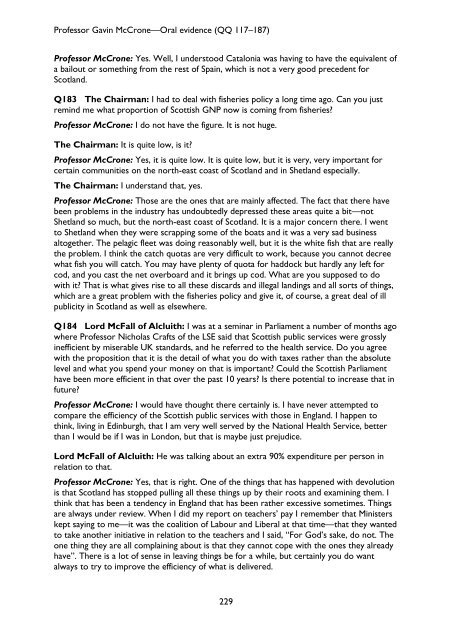SELECT COMMITTEE ON ECONOMIC AFFAIRS - Parliament
SELECT COMMITTEE ON ECONOMIC AFFAIRS - Parliament
SELECT COMMITTEE ON ECONOMIC AFFAIRS - Parliament
You also want an ePaper? Increase the reach of your titles
YUMPU automatically turns print PDFs into web optimized ePapers that Google loves.
Professor Gavin McCrone—Oral evidence (QQ 117–187)<br />
Professor McCrone: Yes. Well, I understood Catalonia was having to have the equivalent of<br />
a bailout or something from the rest of Spain, which is not a very good precedent for<br />
Scotland.<br />
Q183 The Chairman: I had to deal with fisheries policy a long time ago. Can you just<br />
remind me what proportion of Scottish GNP now is coming from fisheries?<br />
Professor McCrone: I do not have the figure. It is not huge.<br />
The Chairman: It is quite low, is it?<br />
Professor McCrone: Yes, it is quite low. It is quite low, but it is very, very important for<br />
certain communities on the north-east coast of Scotland and in Shetland especially.<br />
The Chairman: I understand that, yes.<br />
Professor McCrone: Those are the ones that are mainly affected. The fact that there have<br />
been problems in the industry has undoubtedly depressed these areas quite a bit—not<br />
Shetland so much, but the north-east coast of Scotland. It is a major concern there. I went<br />
to Shetland when they were scrapping some of the boats and it was a very sad business<br />
altogether. The pelagic fleet was doing reasonably well, but it is the white fish that are really<br />
the problem. I think the catch quotas are very difficult to work, because you cannot decree<br />
what fish you will catch. You may have plenty of quota for haddock but hardly any left for<br />
cod, and you cast the net overboard and it brings up cod. What are you supposed to do<br />
with it? That is what gives rise to all these discards and illegal landings and all sorts of things,<br />
which are a great problem with the fisheries policy and give it, of course, a great deal of ill<br />
publicity in Scotland as well as elsewhere.<br />
Q184 Lord McFall of Alcluith: I was at a seminar in <strong>Parliament</strong> a number of months ago<br />
where Professor Nicholas Crafts of the LSE said that Scottish public services were grossly<br />
inefficient by miserable UK standards, and he referred to the health service. Do you agree<br />
with the proposition that it is the detail of what you do with taxes rather than the absolute<br />
level and what you spend your money on that is important? Could the Scottish <strong>Parliament</strong><br />
have been more efficient in that over the past 10 years? Is there potential to increase that in<br />
future?<br />
Professor McCrone: I would have thought there certainly is. I have never attempted to<br />
compare the efficiency of the Scottish public services with those in England. I happen to<br />
think, living in Edinburgh, that I am very well served by the National Health Service, better<br />
than I would be if I was in London, but that is maybe just prejudice.<br />
Lord McFall of Alcluith: He was talking about an extra 90% expenditure per person in<br />
relation to that.<br />
Professor McCrone: Yes, that is right. One of the things that has happened with devolution<br />
is that Scotland has stopped pulling all these things up by their roots and examining them. I<br />
think that has been a tendency in England that has been rather excessive sometimes. Things<br />
are always under review. When I did my report on teachers’ pay I remember that Ministers<br />
kept saying to me—it was the coalition of Labour and Liberal at that time—that they wanted<br />
to take another initiative in relation to the teachers and I said, “For God’s sake, do not. The<br />
one thing they are all complaining about is that they cannot cope with the ones they already<br />
have”. There is a lot of sense in leaving things be for a while, but certainly you do want<br />
always to try to improve the efficiency of what is delivered.<br />
229

















